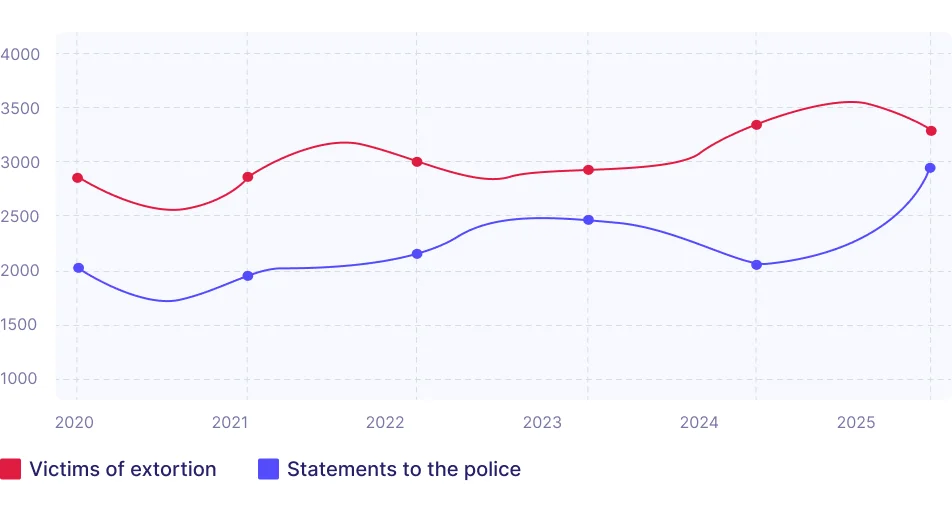Is Extortion Illegal?
Extortion is a serious crime, which refers to threatening, pressuring, or blackmailing someone to give them money, property, or services. Both offline extortion and extortion online are prohibited and subject to legal consequences. Victims of sextortion and blackmail should act right away to protect themselves.

Table of Contents
Key Takeaways
What is extortion and how you can fight this pitiful crime? Before we discuss this matter in detail, understand the basics of this issue.
Extortion Takeaways:
- Extortion is a law-breaking activity that involves coercion or threats.
- It can take the form of sextortion, bullying, blackmail, and others.
- Early reporting of sextortion emails and other cases can prevent further damage.
- All kinds of extortion are punishable under specific federal laws.
Extortion Definition
What is cyber extortion? This criminal act translates to coercing someone for personal gains by threatening violence, exposure, or injury. Victims of extortion scams are usually forced to comply with the wrongdoer’s demands or give up valuables.
Extortion online is a rising issue that can utilize digital networks to demand money, frequently in exchange for private information. One particularly wicked form is sexual extortion, which frequently uses sexual content for pressure. Victims are subdued to potential financial and psychological losses.

Extortion Facts
Extortion cases are getting more common. Here are some facts to back it up:
More Cases
In 2023 alone, financial sextortion cases doubled in comparison to 2022.
Financial Losses
Ransomware extortion attacks netted cybercriminals over $800 million in 2024.
Data Theft
94% of global extortion cyberattacks carried out by ransomware groups include data theft.
Main Target
The USA is the #1 most targeted country in terms of extortion activity.
Is Extortion A Crime?
The act of extortion is illegal regardless of your whereabouts. Being a serious crime worldwide, it can be punished by the authorities. This felony is penalized by both federal and state laws. Cyber extortion now includes manipulative blackmail emails, digital coercion through sextortion, as well as physical threats.
Extortion is also defined by legal frameworks, assuring its general use. The severity of the punishment underlines how devoted the judicial system is to discouraging this destructive misconduct while defending the victims from extortion’s negative consequences. Victims are urged to report this crime at once to start the investigation against cyber criminals.

Extortion Crime Rate
Between 2020 and 2025, reports of extortion crime online have been rising rapidly. Nevertheless, the actual number of extortion online cases is far greater in reality, since not all victims come forward out of embarrassment or fear. Reporting extortion is the key to stopping more crimes from happening.

Federal Extortion Law
All extortion cases are considered serious crimes under the 18 U.S. Code Chapter 41 - EXTORTION AND THREATS §871 through §880. Federal extortion law precisely describes how cyber extortion is treated in the US, including specific penalties designed for different types of this crime. For example, using blackmail against a victim leads to a fine and up to a year imprisonment, or both.
Extortionist Red Flags
Explore the most common extortion red flags you need to be aware of!
-

Unusual or Persistent Demands
Cybercriminals frequently use extortion to put victims under constant pressure. As a result, they require victims to pay them money or do other favors.
-

Threats & Intimidation
Extortionists usually refer to using threats of public exposure of sensitive data, causing injuries in the real world, or leading them to legal problems.
-

Leaking Information
One of the most typical cases is threatening victims to share private or harmful material either with family and friends or online for the whole world to see.
-

Emotional Manipulation
Blackmailers and criminals frequently try to take advantage of their victim’s anxiety and guilt in order to get power over them.
-

Avoiding Legal Channels
Most extortionists will forcibly deter their victims from contacting the police or reporting the crime to local authorities.
Famous Extortion Cases
Extortion and sextortion can happen literally to anyone. Take a look at the three famous extortion scams, which will help you understand the problem better.
Extortion Scams
There are different forms of extortion that anyone can fall victim to. Learn the main differences to know how to deal with this crime.
Sextortion
Criminals threaten to publish secretive and sensitive content, i.e. images or videos, unless a payment is made.
Ransomware
Ransomware hackers lock private files on a victim’s personal computer, demanding money to unlock them.
Blackmail Email
Scammers send fake threats using blackmail emails or phishing schemes to force their victims to do specific actions.
Virtual Kidnapping
Cybercriminals often seek ransom by pretending to be kidnappers, who abducted their victim’s child.
Social Media Extortion
This extortion scam refers to the extensive use of personal information visible on social media, which is used to blackmail victims.
Romance Scams
Scammers pretend to get involved in a romantic relationship with the victim, building their confidence before attempting actual extortion.
How to Avoid Extortion
Stay Cautions Online
Defenselessness comes from unnecessary sharing of public information on the Internet. Cybercriminals are very likely to gather personal data such as your address, birthday, or daily activities to use them against you. Therefore, be mindful of what you share online, and limit the public’s access to your sensitive information. Protect your privacy to reduce the likelihood of becoming the target of extortion.
Use Strong Passwords
A strong and unique password is your first line of defense against extortion online. Prepare a one-of-a-kind combination of capital and lowercase characters, numbers, and symbols to avoid passwords that are easy to crack. Change the passwords regularly using your account’s privacy setting, and use a password manager to stay safe.
Recognize Red Flags
To avoid sexual extortion, look out for the most common signs of sextortion online. Avoid undesirable messages asking for personal data, promising ridiculous rewards, or conveying a feeling of urgency. Watch out for odd URLs, grammatical mistakes, and weird e-mail addresses. Never click a link without checking its legitimacy. If something does not feel okay, it is better to refer to such activity.
Report Extortion Online
If you feel like you are being targeted by a cybercriminal, report any scam or extortion attempts right away. You can use built-in tools for suspicious activity reports. You can get professional extortion help from a team of cybersecurity experts. It is also recommended to go to your local authorities for legal assistance. The sooner you report exertion, the higher the chance to catch the offenders.
Stay Educated
Awareness is the key, as extortion scams tend to adapt to newer schemes. Therefore, you should update your knowledge on a regular basis, using reliable sources, such as reputable tech blogs and government cybersecurity websites. Understanding early signs of extortion allows you to spot and steer clear of wrongdoers.
What To Do If Being Extorted
Are you a victim of extortion? Here are a few simple steps you should take to fight the crime:

Call Our Helpline
Get in touch with our knowledgeable experts in digital forensics and cybersecurity.

Discuss Your Problem
Let us know what issue you are dealing with, so we can prepare the next steps.

Provide Necessary Proof
Gather all extortion evidence, including screenshots of messages and scammers’ data.

Get Extortion Help
Our staff is ready to provide you with the essential information and reporting tools.
Extortion Penalty
Cyber extortion is a serious crime that can lead to the extortionist being penalized:
| State | Maximum Penalty for Extortion |
|---|---|
| California (PC § 518-527) | Up to 4 years in prison + fines |
| New York (Penal Law § 155.30) | Up to 25 years for first-degree extortion |
| Texas (Penal Code § 31.02) | Up to 99 years (life) for aggravated extortion |
| Florida (Statute § 836.05) | Up to 15 years prison + fines |
| Illinois (720 ILCS 5/12-6) | Up to 7 years for felony extortion |
How We Can Help
Extortion online can be a devastating occurrence, but luckily you do not have to face this scam on your own. At ExtortionOnline.com we provide round-the-clock service, offering prompt assistance and direction to help you report sextortion online. We employ a staff of experts who are well aware of your rights to stop online extortion. Our company can assist you in comprehending your legal actions. We will cautiously walk you through the process of reporting sextortion and other blackmailing behavior online. Most importantly, we always emphasize your safety and privacy. We know how problematic these scams can be, and that is why we offer tips on how to deal with extortion. Do not wait any longer; contact us now. Our team is available 24/7 and always ready to help you!
FAQ
Is sextortion a felony?
Yes, sextortion is considered a criminal activity in most jurisdictions around the world, including the US. This felony involves bullying to reveal personal and sensitive content or data until demands—typically sexual or financial—are satisfied. Note that local laws regarding sexual extortion can differ from state to state.
What is the difference between extortion and blackmail?
Extortion is a crime aiming to obtain funds, services, or favors by coercion, intimidation, or force. Blackmail is one of the most common types of extortion schemes, which threatens victims to divulge private or harmful information until demands are fulfilled. Both are prohibited by law and subject to extortion penalties.
How to report extortion to the police?
If you fall victim to online extortion, collect all the necessary proof, such as messages, emails, and media files. Take advantage of an extortion helpline to get professional assistance in reporting the crime to the police. You can report extortion online to the local police, the FBI, or cybersecurity specialists.
How to stop extortion?
If you are being extorted, avoid any interactions with the cybercriminal targeting your persona. Gather all required evidence of each threat, notify your local authorities, and get legal counsel. For extortion online, safeguard your accounts, block the offender’s profiles, and notify the platforms or cybercrime specialists about the issue.
How to Deal With Online Extortion?
Stay calm and act strategically to successfully deal with online extortion. Do not comply with the offender’s request and shut down all communications with them. Change your passwords and turn on extra security measures, including two-factor authentication. Gather all proof of the threats and get in touch with our extortion online helpline. Take advantage of our expertise and experience.